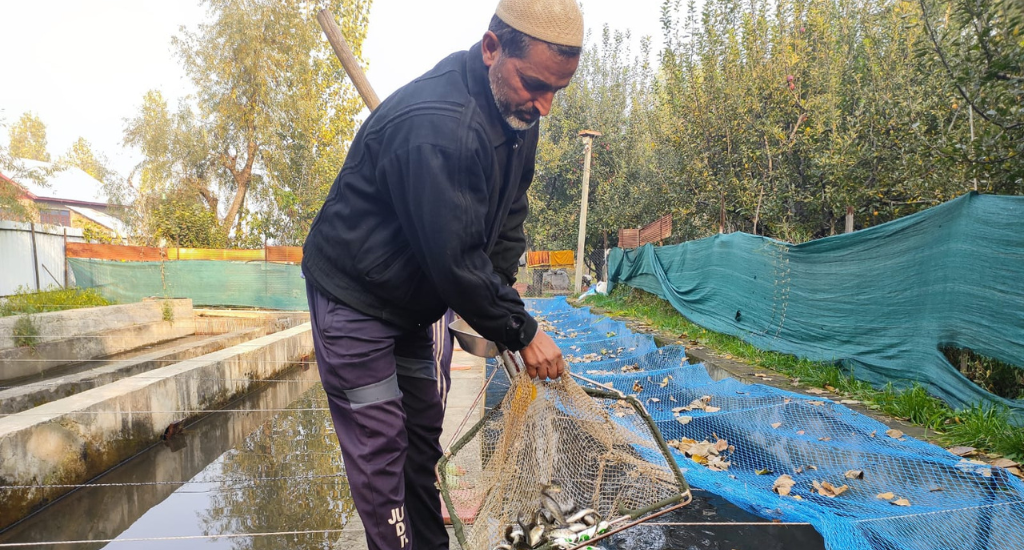
Shielding trout from climate change in Kashmir
Fish farmers combat autumn dry spell with a groundwater harvesting technique that ensures a continuous, round-the-year flow of fresh, cold water vital for their trout.

Fish farmers combat autumn dry spell with a groundwater harvesting technique that ensures a continuous, round-the-year flow of fresh, cold water vital for their trout.
Adil Akram is an agripreneur with a farm where he rears Himalayan trout at the foothills of the majestic Dachigam mountains on the outskirts of Srinagar. But not so long ago, the 25-year-old looked like a fish out of water, with restlessness etched on his face — in conflict with the tranquil vistas surrounding him in the heart of Kashmir’s beautiful landscape.
With the autumn dry spell persisting, Akram faced a formidable challenge. The lifeblood of his trout farm, the perennial Muloor stream that supplies the essential cold freshwater for his fish, was dwindling due to the lack of rainfall.
Akram, an engineering graduate from Bangalore University, sensed the imminent peril facing his farm. A few hours without water could spell the demise of all the precious fish in his farm.

Determined to find a solution, he sought counsel from experts and scoured the internet in pursuit of answers. After consultations with officials from the fisheries department and experts, he found his lifeline – Recirculating Aquaculture Systems (RAS), a groundwater harvesting technique.
“Those were the toughest days of my life. I could not sleep for nights together. Had the farm gone dry even for a few hours, all the fish would have died. But the fisheries department helped me overcome the situation through RAS,” Akram said.
Like him, many trout farmers across Kashmir valley have embraced this innovative technique to combat the harsh consequences of climate change.
Trout was introduced by British officials in a few water streams at the foothills of Dachigam in the early 20th century. It was initially confined to government-managed fishery farms in Srinagar and Anantnag, but recent years have seen a surge of educated youths embracing this occupation.
Also Read: Fishing and fresh springs: Kashmiri festival unites villages

Capitalising on the region’s favourable climate for trout farming, about 1,200 private fish farms have sprung up throughout the Valley in recent decades, providing livelihood to numerous families.
The RAS method involves tapping into groundwater pools to create in-house ponds for trout farming. Groundwater is skilfully extracted through borewells and stored in tanks. The water undergoes a cycle of filtration, with impurities being removed through mechanical and biological processes, allowing for efficient water recycling and reuse. This ensures a continuous flow of fresh, cold water vital for the well-being of the trout.
In the idyllic setting of Sethan village in Kulgam, Reyaz Ahmad stands as the lone woman trout farmer. She annually harvests around 30 quintals of trout fish, using the water-harvesting technique.
“This process ensures not only a continuous supply of fresh, cold water to the trout but also liberates farmers from the constraints of timely rainfall,” Ahmad said.

This shift allows farmers to raise trout throughout the year in their farms, unhindered by the unpredictability of weather.
“It is a profitable business. There is a consistent demand for trout throughout the year. The introduction of RAS has guaranteed availability of the fish round the year. We are now hopeful of finding markets in other parts of the country as well,” said Hina, who has pursued MBA and manages a RAS-enabled farm at Awantipora in Pulwama district.
Also Read: Trout fish lifts Sikkim woman out of poverty
Although the locally produced trout is primarily consumed within the region, farmers are determined to expand their reach to other states in India and even global markets. Statistics from the fisheries department show that approximately 1,500 tonnes of trout are produced annually from both government and private farms in the Valley, yet the demand for this fish surpasses its supply.
Hilal Ahmad Bhat, the extension officer of the fisheries department in Srinagar district, said that they support farmers in adopting this new technology by providing subsidised schemes. The importance of harnessing groundwater for fisheries in Kashmir was especially felt in August this year, characterised as one of the driest months in a century, when dryness enveloped most parts of the Valley, he said.

“Apart from ensuring regular freshwater supply to the farms throughout the year, the technique also halves the quantity of feed as the water stored using the RAS system contains more oxygen, ammonia and other nutrients, facilitating the robust growth of the freshwater fish,” Bhat explained.
With water bodies shrinking, meagre snowfall and erratic weather patterns contributing to dwindling water levels in the streams, the survival of Kashmir’s trout fish is facing threats. However, the fish farmers, aided by government initiatives, have successfully shielded their livelihood. The climate may change, but their commitment to preserving this fish remains steadfast.
Also Read: Fish on The Menu: A tale of reverse migration, malnutrition and tribals of Odisha
The lead image at the top shows a fish farmer at his farm at Mohipora in Kulgam district of Jammu and Kashmir (Photo by Nasir Yousufi)
Nasir Yousufi is a journalist based at Srinagar.